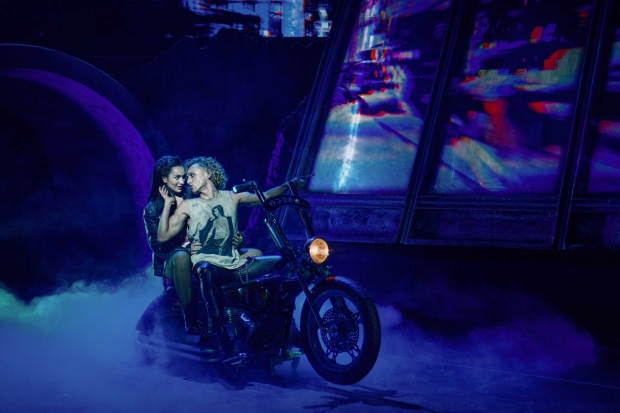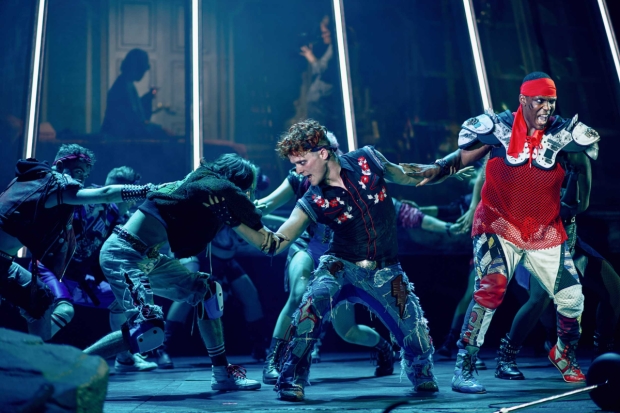Bat Out of Hell review – the unique rock musical hits the open road
After being delayed by the pandemic, ”Bat” is back

Bat Out of Hell commences its Covid-delayed new tour where it originally began: in Manchester. Fuelled by the late Jim Steinman’s greatest hits, it’s intent on roaring louder than anything else. From the moment you enter, an engine purrs away in the background, before actors clad in leather as black as petrol crawl onto the stage to polish the central motorbike. They’re preparing a production which is, almost quite literally, a vehicle for Steinman’s music.
The story he assembled around it is a dystopian hybrid of Peter Pan and Romeo and Juliet. The daughter of an apocalyptic city’s tyrant, Raven, falls in love with the leader of age-frozen misfits, Strat. But their romance also upsets the tightknit wider group, with Strat’s soulmate Tink seeking the same revenge as Raven’s father, Falco.
Music and anarchy decorate the stage. Out of Jon Bausor’s grunge-grey set — all upturned tyres and tarmac — shoot five LED bars angled like guitar strings. Glenn Adamson’s spindly frame makes him look more boyish, but also like the neck of a guitar. Strat obsesses about electricity in the body, and Adamson metabolises the idea into electrifying frenetic energy. His slender nimbleness allows him to almost swoop around like a bat as he springs off the set. At the interval climax, “Bat Out of Hell”, he strips off to expose sweat and blood drenching his chest, draping himself in front of the crashed motorbike like a piece of burst machinery.

© Chris Davis Studio
Perform these classic rock songs with enough eardrum-rupturing volume and percussive propulsion — which they do — and they’ll inevitably strike a chord. But the slightest segue is used to jump from one number to the next, and the rock nostalgia of the overstuffed, overlong songs isn’t enough to sustain a three-hour show. It tries to distract with a chaotic inferno of exploding confetti cannons, smoke, fire and strobe lighting. Although wildly excessive, it nicely amplifies Raven’s experience of being smothered with everything in the world except love.
It commits much less to its ensemble. The lack of synchronicity to Xena Gusthart’s choreography is as sloppy as the underdevelopment of its peripheral relationships. In other anthems like “Two Out of Three Ain’t Bad”, actors Joelle Moss and James Chisholm give a belting performance but are left awkwardly unaccompanied and stranded in the space.
There’s refreshing comic relief outside the musical intensity: hand sanitiser disinfects a spit-sealed handshake, and musicians clamber out the orchestra pit with broken instruments after an engine is slung down there. But when it occasionally quietens down for moments of interiority, speeches are overcranked or confoundingly abstract over eerie metallic background music: “I will desecrate this city, With the extinction of light.” This only makes the thin plot and structure less coherent.
Just as the characters undergo fickle changes of heart, the story is unsure who it cares about. The first half focuses almost exclusively on the parents’ sex life. Indeed, “The Lost” are fixed at the age of 18, and the show shares a teenager’s crass lustfulness. The parents’ endless motorboating, dry-humping and stripping down to lycra underwear prevents any serious chemistry igniting between Raven and Strat. It’s also difficult to pity Raven when Rob Fowler’s overbearing father figure loses all menace with camp overstatement, reclining on skull-encrusted sofas and cavorting a large silver ornaments. However, Sharon Sexton’s Sloane cuts through brilliantly with her forlorn expression and wry, weary delivery as his long-suffering wife.
It’s ultimately more of a bats**t-crazy rock concert than an accomplished narrative musical. Bu Steinman fans will be enraptured by its tyre-screeching, adrenalising ride to hell and back.













